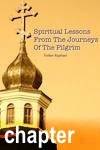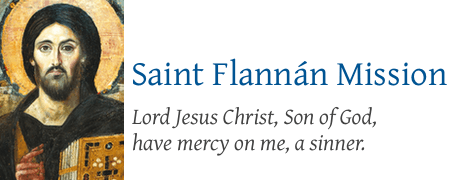 When assailed by the evil one, what state of mind do we have? Fear? Anger? Or an immovable faith and trust in God?
When assailed by the evil one, what state of mind do we have? Fear? Anger? Or an immovable faith and trust in God?
Dear beloved,
Some people find it hard to understand the meaning of monasticism. Conversely, for some of my friends in the pastoral labors (monastic or not), they would also find it difficult to understand many of the secular challenges we face in the world. But yet, each of us is ordained by God and equipped by Him with different gifts, to tend to different tasks, and to lead different lives. The unifying foundation for all of us is that God desires all of us to reconcile from our fallen state, back to Him.
Likewise, the pilgrim was talking to a priest who kept persuading him to labor with him in Church, but the pilgrim would not, but very much desired to continue his journey as a lonely pilgrim. Therefore, to the pilgrim, God has given him the blessing of a pilgrim who would lead a solitary life, dedicated to prayer.
Father among the saints, Saint John Chrysostom, said: “For even one dwelling in a city may imitate the self-denial of the monks; yes, one who has a wife, and is busy in a household, may pray, and fast, and learn compunction. Since they also, who at the first were instructed by the Apostles, though they dwelt in cities, yet showed forth the piety of the occupiers of the deserts: and others again who had to rule over workshops, as Priscilla and Aquila. (Homilies on Saint Matthew, number 55).
Soon after, the young girl who learned the Jesus Prayer from the pilgrim ran to him, pleading with him to take her with him. The young girl was to be betrothed to a schismatic, and she would not want to. Just when they were talking, people from the village caught up with her, and dragged her back to the village. The villagers chained the pilgrim and accused him of seducing the young girl. However, the village priest who employed the pilgrim for sometime, promised to stand testimony for him. And when the magistrate presided on the case, he determined that the young girl was to be handled by her parents, while the pilgrim would be caned and then thrown out of the village.
The pilgrim was not disturbed or angry (Ephesians 4:31-32), but praised God for allowing him to suffer for His name, and the pilgrim joyfully returned to unceasing prayer. The young girl’s mother saw the pilgrim, told him that the person whom the girl was to be betrothed to, had severed the impending marriage. The mother gratefully gave him some bread.
Often, when the evil one assails us, some of us might be tempted to lapse into a fallen state, and become angry or even harbor hatred. The devil will then “fan the fires” and we will sink deeper and deeper in the abyss, and become a slave to the devil’s labors (St James 1:20).
The starets again appeared to the pilgrim in a dream, to advise him the teaching of Saint John of Karpathos, where teachers are sometimes placed in situations of shame and temptations, so that others may benefit spiritually and gain the strength of faith. Even in the worst of challenges, we are to remember that Christ is above all creation and the evil one’s works (1 John 4:4).
Our consolation is in the Lord, and His Divine mercy and grace on our failings. We are called to be marathon runners, to last throughout our lives, to persevere to the very end when we face death squarely. If we fall during many parts of our lives, we are to dust ourselves and pick ourselves up and start running towards God again (Proverbs 24:16).
The starets also instructed the pilgrim through the dream, that if one persists in prayer, he should record down everything, and teach the inner prayer to others. The Christian community is one of strengthening, edifying, and nurturing the faith of other Christians (Proverbs 18:19).
One day, the pilgrim felt an irresistible desire to receive Communion, on the feast day of the Annunciation of the Most Holy Theotokos. He found a church some distance away, and walked, and walked. He was totally drenched by a heavy rain, but managed to reach the church in time for the Holy Mystery in such an important feast day. The Mystery of the Communion is a beautiful event and should be treasured, celebrated as often as we can. It is the means of partaking in the wondrous joy, with fear and trembling as many of us experience on a frequent basis, awed by the Divine Liturgy and the prayers.
Because of the rain, the pilgrim’s legs became infected and completely paralyzed, unable to walk. He was chased out of the compound and collapsed at the church steps and laid there for two days, totally ignored by people walking by when he pleaded for help.
When those who are suffering, and in pain, ask us for help, are we blind to their woes? Or do we tend to them as we see in them, an image of Christ? (St Matthew 25:35).
Let us pray unto our Lord, with the heart of a penitent:
“Lord Jesus Christ, Son of God, have mercy on me, a sinner.”
